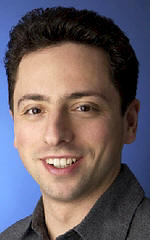|
 |
How to change the
world: Google
Cómo cambiar el mundo: Google |
|
Google
began in 1996 as a project by Larry Page and Sergey Brin. Larry and
Sergey were both studying at Stanford University in Palo Alto, California. In their
research project they came up with a plan to make a search engine that
ranked websites according to the number of other websites that linked to
that site. |
 |
|
The domain google.com was registered in 1997 and
Google Corporation was formed a year later. Google started selling
advertisements with its keyword searches in 2000, and so Google Adwords and
Adsense were born. The term PageRank was patented in 2001 – this term is
actually named after co-founder Larry Page and not, as some think, named
because it is the rank of a webpage. |
|
In 2004, Google launched its own free web-based email
service, known as Gmail. This service was made to rival the free online mail
services supplied by Yahoo and Hotmail. |
|
| |
|
 |
|
Google also launched Google Earth, an amazing creation
that is a map of the earth based on satellite imagery. The cool part is that
you can zoom right in to street level and actually see your own street and
even your house! In 2006 Google launched Google Video, a cool search tool
with thousands of videos to make your search: from personal homemade videos
to TV shows made by the big television corporations. |
|
In 2006 Google was added to the Oxford English
dictionary as a verb – the verb "to Google" has become so popular that
Google has even been worried that their brand name might lose their
copyright and patent protections. |
|
| |
|
|
Today. Google is the most widely used search engine on
the internet with a 54% market share and receives about a billion search
requests per day. Therefore, with the many applications and products that
Google has brought out, and the control it has over the internet it is
possible that Google will become a very influential part of our lives in
years to come. |
|
VOCABULARY
|
|
 |
|
research project: trabajo o proyecto de
investigación; they came up with a plan:
se les ocurrió una idea o plan; search engine: motor de búsqueda; that
ranked: que clasificara, que ordenara; according to the number:
de acuerdo con la cantidad; that linked: que enlazaban, que
vinculaban; domain: dominio (sistema de denominación utilizado
en); keyword searches: búsqueda por palabras claves; were born:
nacieron; is
actually named after co-founder: en
realidad lleva el apellido del cofundador; as some think: como
algunas personas creen; launched: lanzó al mercado; was made to rival:
fue creado para competir con; amazing: sorprendente; zoom right in to street level: aproximarse
hasta el nivel de una calle; homemade: caseros, hechos en casa; was added to:
fue incorporado/a a; brand name: nombre de marca; might lose:
podría perder; most widely used: más utilizado en todo el mundo; with a 54% market share:
con un 54 por ciento del mercado total; requests: consultas; has brought
out: ha producido; in
years to come: en los años venideros. |
|
 |
Activity 89: Basándote en
el texto anterior selecciona las alternativas correctas para completar
las oraciones. Verifica luego las
respuestas correctas.
|
 |
|

|
¡¡ FELICITACIONES
!! Has finalizado la
LECCION 8
del curso Avanzado conversacional.
Antes de pasar a la siguiente lección, por favor asegúrate de
repasar todo lo que has aprendido aquí. |
|